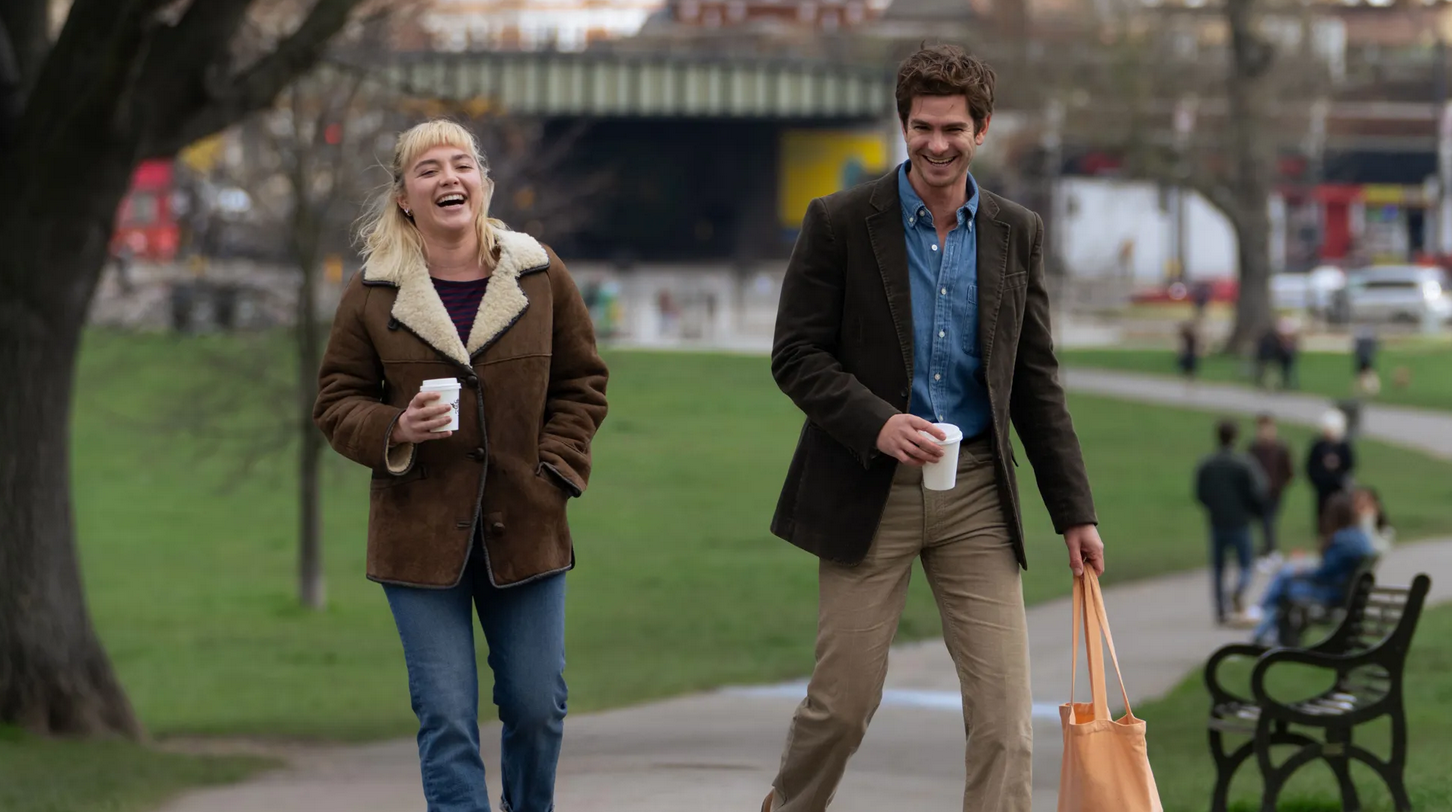WE LIVE IN TIME is an incredibly heartfelt exploration of a relationship
We Live in Time
Written by Nick Payne
Directed by John Crowley
Starring Florence Pugh, Andrew Garfield, Grace Delaney, Lee Braithwaite
Runtime 1 hours and 44 minutes
MPAA Rating R for language sexuality, and nudity
Premiered at TIFF and in theaters October 11
by Billie Anderson, Staff Writer
“I can’t bear the thought of being forgotten.”
During a festival like TIFF, audiences are inundated with an array of arthouse films, biopics, enigmatic dramas, character studies, and experimental narratives. In this landscape, a classic romantic dramedy often slips through the cracks, overshadowed by more avant-garde fare. Unfortunately, We Live in Time, John Crowley’s latest film (Brooklyn, Boy A), finds itself in this overlooked category. Yet, this film seems crafted from the dreams of every Gen Z woman: it features the relatable and down-to-earth Florence Pugh alongside the ever-charismatic Andrew Garfield, as they navigate a poignant love story over an hour and a half. Initially, I approached it with skepticism—was this pairing too good to be true? What I wasn’t anticipating was an incredibly heartfelt, nuanced, and realistic exploration of the beginnings and endings of a relationship told non-chronologically.
We Live in Time unfolds the lives of Almut (Pugh) and Tobias (Garfield) in a series of vignettes. The film opens with Almut waking early in their shared home, preparing a fresh breakfast from homegrown ingredients and gently stirring her husband, Tobias. However, this isn’t where their story truly begins; Almut and Tobias' love story starts as every other: with a car accident. It's the perfect meet cute. Almut is a Michelin-starred chef, while Tobias is a mid-level Weetabix employee–a classic pairing. The narrative bounces through their journey—dating, pregnancy, cancer treatment, and parenthood—emphasizing the inevitability that Almut’s illness casts a shadow over their love. This knowledge can create hesitance, yet Pugh and Garfield’s magnetic performances pull you in, making it impossible to look away. The film’s exploration of time is paradoxical: while it grapples with the harsh reality of life’s brevity, it invites the audience to savor every precious moment. About thirty minutes in, the film lays bare its title’s significance when Almut and Tobias experience what appears to be their first fight. It’s reminiscent of those “Live. Laugh. Love.” throw pillows that preach “Live in the now, it’s all you have.” This sounds like a mark against it, but given that we know early on that this story won’t last forever, it’s a nice reminder of how precious each scene they have is. The non-linear structure adds so much depth to a story that we’ve truly seen time and time again, really allowing you to ride the wave of their relationship and giving belief to the sentiment of choosing to love despite knowing you will lose.
Pugh and Garfield ignite the screen with palpable chemistry, whether they’re kissing or sharing a laugh. Their love story stands out as one of the most compelling I’ve witnessed this year, even set against a somewhat sterile backdrop. The duo draws you in, making you laugh and cry alongside them. They play perfect foils: Pugh embodies passion and boldness, while Garfield brings a gentle, caring warmth. The casting director that sought out Pugh and Garfield, knowing that they both have chronic sad face (we all know Pugh’s frown) is clearly actively seeking to ruin audiences’ lives.Their connection is palpable from the very beginning, maintaining its intensity throughout nearly every scene. I was especially moved by Garfield’s performance. He showcased the balance in being a good partner to someone carrying a heavy load— knowing your own wants and needs don’t disappear in light of your partner needing to be the priority and holding space for that truth while also holding enough space to know when it’s not about you.
While many "cancer films" tend to rely on clichés, Nick Payne’s insightful script subverts these expectations. Instead of resorting to traditional dying-in-bed scenes or overly sentimental farewells, the film takes a different path. Almut's illness is rarely portrayed dramatically—if at all. We catch only fleeting glimpses of her chemo-induced nausea, emphasizing her desire to be remembered not for her suffering, but for her vibrant life. Almut is vivacious, ambitious, a talented ice skater and chef, a devoted wife, and a loving mother. She worries that her five-year-old daughter, Ella (Grace Delaney), will only remember her as a woman defined by her illness. So much of the plot is carried by Almut’s fear: it is crucial that Ella carries forward memories of her that transcend her final days and death.
Payne and Crowley steer clear of manipulation, even amidst the film's poignant themes. Where other filmmakers might lean on emotional triggers, Payne opts for a refreshing perspective. One of the final scenes in the movie ends on a surprisingly positive note, taking on more of a symbolic meaning than one designed to leave audiences in tears. I think this choice enhances the film’s message–it makes it more impactful and more emotional than the easy route of tragic loss or endings. We Live in Time transcends the typical “cancer film” label; it’s a beautifully crafted love story, brought to life by the chemistry and charisma of its lead actors. This kind of romance is special, rich, emotional, and intricately layered, yet also light, kind, and filled with love. It didn’t leave me breathless, or weepy like so many others, but it did provoke some serious introspection. It made me reflect on my relationships, the legacy I want to create, and the fleeting time I have to make a difference. In a truly hedonistic sense, I found myself questioning: am I truly doing enough to secure my own happiness before it’s too late? Reflecting on it, I realize it’s the kind of story that takes time to unpack, revealing deeper meanings with each revisit. In a landscape crowded with films designed to force tears, this one will remain at the top of my list for a long while.



